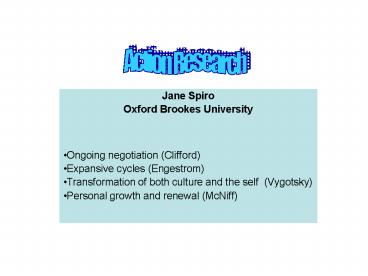Jane Spiro - PowerPoint PPT Presentation
1 / 18
Title:
Jane Spiro
Description:
Knowledge is non-finite, slippery', subject to change and ... what is other and different, to what challenges, irritates, or even disturbs us.' OR ' ... – PowerPoint PPT presentation
Number of Views:201
Avg rating:3.0/5.0
Title: Jane Spiro
1
Action Research
- Jane Spiro
- Oxford Brookes University
- Ongoing negotiation (Clifford)
- Expansive cycles (Engestrom)
- Transformation of both culture and the self
(Vygotsky) - Personal growth and renewal (McNiff)
2
Why action research compared to other paradigms?
- Ideas of knowledge epistemology
- Knowledge is non-finite, slippery, subject to
change and interpretation the swamp - OR
- Knowledge is a truth to be reached by finding and
interpreting information the mountain (Schon)
3
Ideas of learning
- We might look at learning as a response to what
is other and different, to what challenges,
irritates, or even disturbs us. OR - We may look at learning as the acquisition of
something we want to possess.
(Biesta 2006)
4
Ideas of data
- Data is
- gathered scientifically
- can be quantified and defined
- is neutral.
- OR
- Data
- is gathered through observation and experience
(Eisner 1993) - influences practice
- is hugely complex
- Is subject to a wide variety of interpretations
- is context-sensitive.
5
Slippery truths
- All texts in the social sciences are in one way
or another fictions, constructions, and we need
to treat them as such, not as inviolable,
unassailable statements of scientific truth
(Geertz 2006)
6
Fuzzy generalisations
- something may happen but without a measure of
its probability. It is a qualified
generalisation carrying the idea of possibility
but no certainty. (Bassey 2001)
7
Soft outcomes
- Researchers make a distinction between the
humanities and the sciences value judgements
between what is legitimately rigorous and
objective and what is soft and stupid. (Olson
on Geertz 2006)
8
What can action research do which the others
cannot do?
9
What is the researchers role in each paradigm?
10
What does that mean on the ground for how the
researcher gathers and interprets information?
11
Research paradigms world views
- All-embracing
Piecemeal - Law-making Law-breaking
- Journey to complete understanding (Deutsch)
- Journey without an end (Popper)
- General
Specific - Reality as ordered
Reality as messy (Schon) - (Einstein)
- Control
Describe - Leads to closure
Leads to opening
12
Research and creative practice
- a postmodern artist or writer is in the position
of a philosopher the work he produces are not
in principle governed by pre-established rules,
------- - The artist and the writer are working without
rules in order to formulate the rules of what
will have been done. (Lyotard 1984)
13
References
- Bassey, M. (1998) Fuzzy generalisation an
approach to building educational theory - Paper presented at the British Educational
Research Association Annual conference Queens
University Belfast, 27th 30th August 1998
http//www.leeds.ac.uk/educol/documents/000000801.
htm - Biesta, G.J. J. (2006) Beyond Learning
Democratic Education for a Human Future
Boulder Paradigm Publishers - Bryman, A. (1988) Quantity and Quality in Social
Research. London Routledge. - Clifford, J. and Marcus, G. (eds) (1986) Writing
Culture The Poetics and Politics of Ethnography
Berkeley University of California Press - Eisner, E. (1993) Forms of Understanding and the
Future of Educational Research - Educational Researcher October 1993
- Lyotard, F. (1984) The Postmodern Condition a
report on knowledge Manchester Manchester
University Press - McNiff, J. (2002) Action Research principles and
practice London Routledge - McNiff, J. (2006) Action Research living theory
London Sage - Olson, G.A. (2006) Clifford Geertz on Ethography
and Social Construction interview in JAC Vol.
11 Issue 2 http//www.jacweb.org/Archived_volumes
/ - Schon, D. (1983) The Reflective Practitioner
how professionals think in action New York
Basic - www.jeanmcniff.com
- www.actionresearch.net
14
15
16
17
18































